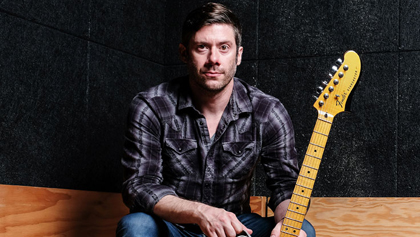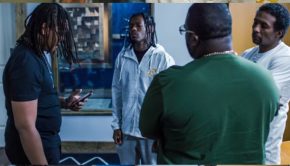Wes Borland On Limp Bizkit, Painting, Cats, Moogfest & Detroit
Wes Borland first experienced success on an international level as the founding guitarist of Limp Bizkit. With Fred Durst, DJ Lethal, Sam Rivers and John Otto, Borland would sell an estimated 50 million albums worldwide. Borland first took time off from Limp Bizkit in 2001 and eventually returned to the fold in 2009, although Limp Bizkit has only been one facet of Borland’s career as an artist.
Beyond leading the group Big Dumb Face, which first formed during Borland’s initial Limp Bizkit run, Borland has put out 4 albums with Black Light Burns. He released his first solo album — Crystal Machete — in 2016, with another one forthcoming. He has also been part of various projects with Marilyn Manson, Korn’s Jonathan Davis, The Crystal Method, From First To Last, Filter, and Tech N9ne.
Earlier this year, Borland performed a 4-hour solo set at Moogfest 2018 in Durham, North Carolina. I had the pleasure of speaking with Borland by phone — calling in from Germany — following his Moogfest appearance about what is coming up for him personally and professionally. Borland can be followed on Instagram via @TheWesBorland and on Twitter as @WesBorland.
When you were working out your Moogfest set, did you know that it was going to be a 4-hour set to begin with?
Wes Borland: Yeah, right off the bat when I first met the folks from Moog Music, the people that did the festival. They explained what the duration of the set was to me and asked me to do it… I, obviously immediately was overwhelmed by the time, and then I guess that was a year before the actual event happened… I actually planned it for about 5 months and then really diligently worked on it for about 3 months before it actually happened. So it was a lot of preparation, a lot of stockpiling loops and samples…
My set looked more like clusters of notes, like small paragraphs for each section that I was going to move through. It was probably the most challenging thing I’ve ever done, and it was a mix of improvisation and certain selections and pieces of selections, also my first solo record which was an instrumental record, and then the current one I am working on now. Just sort of a blend of all kinds of different things.
Prior to taking this on, what was the longest continuous piece of music that you had worked on?
Wes Borland: I have a really silly project called Big Dumb Face, and there had been 2 records that both end with a track that is about 20 minutes long… There is a lot of folly in it and a lot of people running around and environmental recordings and just, like, ridiculousness, which I think that mixed with what I am doing instrumentally and song-wise were sort of both relevant in what I was doing for Moogfest. So I kind of had to pull from several different aspects of my history.
Speaking of your history and Big Dumb Face, it has always been intriguing to me the variety and the depth in your career. Big Dumb Face and Limp Bizkit have absolutely nothing in common musically, the composing that you showcased at Moogfest has little to do with Black Light… Does that apply to other facets of your life as well in terms of your interests being very diverse?
Wes Borland: I think that I am a very curious person, and when I get into something I tend to go very deeply into it and to find out everything about it, to where I have little sections of my life where I will have an obsession and kind of pursue everything there is to do and know about that. For instance, for the last couple of years I have been blacksmithing a lot, I sort of learned how to do it and got pretty good at it, and then did it a whole bunch. Then it kind of ran its course into something else, and it is now something that I know how to do and I have that sort of tool in my belt, so to speak.
But it is not like I would let the obsession die down a little bit and just acquire a skill or something… I have never stopped being interested in learning, so whenever I am working on different musical projects I like for them to have parameters and a purpose and not just be kind of a shot in the dark. I am open to accidents happening and for human error and inspiration to hit, but I definitely always have a plan beginning something and like a target I am shooting for. So I think when different musical projects sound completely different, it is because I have put very strict parameters in place to keep them from bleeding into each other and sounding like all the same thing all the time with a few minor differences.
That is very interesting to me because the average person, I find, when they are really interested in something and they are going all in, it is usually from the trivial aspect in terms of learning fun facts and all they can in a quick sense. But it sounds like the create adventures that you do, you are actually hands-on with all that…
Wes Borland: Yeah, I actually want to learn how to do it… I have 2 modes I work in, 1 where I am completely in the driver’s seat and guiding something and incredibly almost aggressive about keeping the ship on-course. And then I have another mode where if a friend of mine or my wife or someone else asks me to work on one of their projects, I completely let go of the reigns and take a supportive role, where I am not showboating or trying to overstep them. I limit opinions to being helpful to what their vision is…
I don’t know, whatever I do I want to learn how to do it and do it well, and I think in working situations with other people — because I am so stubborn in what I want — I wanted to learn how to do everything, like engineer and mix and do all aspects of everything. So it was really out of convenience for myself and my work ethic, because I don’t like waiting on people, and I like to work in a very quick way and I like to capture something and finish it and release it. Anything else is non-exciting for me… I feel like it is like beating a dead horse in a way, I just don’t like that.
Per another interesting thing I have read, is it true that you live in Detroit these days?
Wes Borland: I do, I live between Detroit and Brooklyn, but I am mostly in Detroit. That is where I work mostly.
What brought you out to Detroit in the first place?
Wes Borland: My wife and I had both been in L.A. for a long time, I had been there for 15 years and she’s been there for 11 years, and we were just looking at different places that would be interesting to move. Detroit seemed to have some interesting things happening in it and it is a place where I could buy property and build a very large studio, and to the point where I wouldn’t be able to afford to do that anywhere else, to the scale that I wanted to work in.
It is just exciting, and I had never lived with harsh winters before. So I wanted to experience something different and she was really excited about the city and yeah, we’d never lived in the Midwest, so there you go.
Did any of that have to do with over the years in coming through a city like Detroit and going, “oh yes, I have had great memories going through there?”
Wes Borland: The first time I ever played in Detroit, from my hotel window I saw someone shoot several rounds of a gun into a windshield, so it wasn’t really from that memory… I thought of Detroit as kind of a frightening place because I think a lot of people have over the years that was kind of lawless, but after we went there and spent time there and checked out some restaurants, I think it was like 2014… We ended up really loving it, and the city has changed a lot. It is off of the top 20 most dangerous cities[list]. It is big… There is kind of an excitement and an energy there. So we’ll see, fingers crossed, everybody there is doing the best they can to make something happen. That is good for the people who were there before and the new people coming in combined.
Another thing that I’ve read about you is that you are involved in cat rescue. Is that true?
Wes Borland: I am, yeah. There was a huge animal problem in Detroit, like stray and wild animals were there. So many people they call it “white flight” — after the riots when white flight happened and all the white people left — there was all the disarray with the people losing their jobs and other industry and nature just started to take back over and people were just releasing their animals, you know, decades ago.
Now there are wild dogs that behave like packs of wolves and cats in basements of abandoned houses and they are just everywhere, so we tried to get involved in capturing and spaying and releasing… Doing that a lot, and I have come across a bunch of nice cats and raised wild kittens and placed them in homes. I guess we’ve placed like 150 or 200 cats in homes since we’ve been…
Have you always been charitably minded or has this been the first course you really got behind?
Wes Borland: I think that this is the first one that sort of affected me where I was seeing it every day… I am not religious but I grew up in a church and my father is a minister and I had done mission work before, like building in villages and doing Habitat For Humanity before, but this was when I was younger. This was the one that was actually like, “oh this is a little thing that I can make a small difference by just focusing on this.”
So we’ve made a small difference. It is not even a dent in the problem, but I think that for the cats that we come across, they’ve got much better lives, and they make people happy.
Prior to getting involved in all this, were you into cat videos? Or is that just a totally different thing?
Wes Borland: Mostly my wife is cat-crazy, and I kind of inherited that. It rubbed off on me, then I go really determined to be part of it.
Right on. So back to the music here, Astral Hand I believe is your forthcoming album. How is that coming along?
Wes Borland: It is coming along well, I would say like 60 to 70 percent done. I know what I have to do to finish it. I am touring so much right now, doing my day job with Bizkit. Usually I only like to take 6 weeks on a record, but this one has been riddled with problems as far as time constraints. I will work on it for a week or 2 and I’ll get pulled off it…
This has just been an insanely busy year for me, so I am trying to finish it as quickly as I can, but I have broken one of the rules, which is 6 weeks. It is my time limit when making a record by myself, and I blew it. I haven’t done it within that timeframe because I couldn’t, so I just have to — I am going to add a rule or something, I am not sure what it is yet.
That is a very interesting thing that you just referred to Limp Bizkit as a day job. Has it always felt that way to you?
Wes Borland: No, it feels that way I think now because it is my job. I enjoy doing it and I get along with everyone that I do it with, but I feel like I am going to work when I go out and do this, and it is not that that is a bad thing. I love what I do, but I just jokingly referred to it as my “day job” because it was kind of funny.
Sure, and besides all these music that you are working on, and the cats and all that, is there something that you wish more people knew about you? I ask that because the press release that I got was that you’re sort of re-inventing yourself. Is that something that you’re going for personally?
Wes Borland: I think, yeah. I mean, I have always wanted to score film and I’ve always been an oil painter and wanted to paint more as well, and I have more time for that, which I am doing right now a lot of. I am working on a series of oil paintings which is 20 seated women that are all different and they are all 6 by 4-feet, huge paintings… I am going to put them out at once, but I really want to move into aspects of career and art that age well, I guess, like scoring films, being an oil painter…
I don’t really want to be doing music on-stage forever, you know in my 60s where I am still playing Limp Bizkit shows. I am going to go see Iron Maiden tonight and they’re one of the bands that — I just happen to be in Munich and — they are playing the festival we’re playing tomorrow, they’re headlining tonight and I am going to go check them out because it is Iron Maiden. But I don’t necessarily want to be in their position, where I am their age doing these festivals, I think I’d like to be at home more, I love being in the studio and working, and that is what I kind of what to grow into, doing full-time.
Right on. So any last words for the kids?
Wes Borland: I don’t know, I don’t think the kids need any last words. They are sort of smart these days, kids just seem to be aging more quickly and having a better grasp on what is happening in the world than adults do. So I think they’ve got it covered.






























